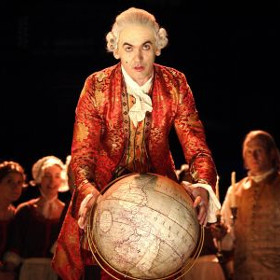Michael Coveney: Women playwrights the National Theatre forgot to honour
Did the National’s failure to include more female playwrights in its 50th anniversary gala indicate an institutional gender bias? Not necessarily, says Michael Coveney

I'm always a little uneasy about gender balancing arguments when it comes to the theatre in general and the National Theatre in particular. It was indeed bizarre that only Alecky Blythe was represented as a woman playwright onstage at the NT 50 gala on Saturday night (although Rebeccca Lenkiewicz, the first woman to have a play presented on the Olivier stage, 2008's Her Naked Skin, about suffragettes, was in the audience).
But then again it's not as though women have been ignored by the NT any more than men have been, or people from Scotland. Laurence Olivier was the first to acknowledge the influence of Lilian Baylis, who ran the Old Vic when he was starting out. On the other hand, I remember interviewing Peter Hall's team of administrators and close colleagues when he took over, and they were all men. All nine of them. And all in suits. (Peter Stevens, Hall's administrator, and a robust-looking 81 years old, was at the gala.) But that was in 1975. And Hall did give Thelma Holt her head for organising some brilliantly successful international seasons.
And just out of interest, and prompted by Catherine Love's blog yesterday, I've checked out the playwriting credits. There are not nearly enough women in that category, you could easily argue, but there are plenty to be going on with. At the Old Vic, Olivier himself co-directed The Advertisement by Natalia Ginzburg, when she was still alive, in 1968, and in the next season Joan Plowright directed Maureen Duffy's Rites.
On the South Bank, the late Mike Ockrent directed Lillian Hellman's Watch on the Rhine in the Lyttelton in 1980 (she died in 1984) and in 1981 Dario Fo and Franca Rame (husband and wife) were represented by One Woman Plays, a magnificent tour de force performed by Rame solo. A 1985 festival of new plays included work by Debbie Horsfield and Rosemary Wilton (Penelope's sister) and in 1986 Frances de la Tour devised (with David Leveaux) her own selection of Shakespeare's sonnets, Only Fourteen Lines, while Sarah Daniels chipped in with Neaptide, both of these in the Cottesloe.
Sophie Treadwell's Machinal was directed by Stephen Daldry in the Lyttelton in 1993 (magnificently performed by Fiona Shaw) and in 1994 the Cottesloe housed both Caryl Churchill's The Skriker and Githa Sowerby's Edwardian classic Rutherford and Son; in the same year, Howard Davies directed Hellman's great spooky schoolteacher play The Children's Hour.
There were new plays in 1995 and 1996 from Winsome Pinnock (Leave Taking) and Pam Gems (Stanley, a superb play about the painter Stanley Spencer and his women with Antony Sher and Anna Chancellor in the cast directed by John Caird)… there were plenty more, never forgetting Helen Edmundson's version of War and Peace, or her brilliant version of Coram Boy, one of the biggest hits of 2005/06, or indeed Gitta Sereny's openly acknowledged book about Hitler's architect for the play David Edgar wrote about Albert Speer. And Katie Mitchell, who often works as much as an auteur as a director, could not have been more absorbed into the bones of the NT than she was by Hytner.
And then there was Charlotte Jones' brilliant Hamlet shadow play, Humble Boy, in 2001 and Joannna Murray-Smith's equally remarkable Honour in 2003, meaty roles in each for Diana Rigg and Eileen Atkins, both much missed at Saturday's gala… you could say that the gala should have done more to reflect all these plays by women, but then again you could have said the gala could have done countless other things, too; logistics and what could fit the bill, and make sense in a short extract, must have been a nightmare to contemplate, let alone carry out as brilliantly as it was.
But it's no doubt true that those plays I've mentioned might have been more generously represented, and perhaps they were even considered, but it didn't work out. It would be dangerous, though, to assume that the male playwright-dominated programme of extracts signified some kind of deliberate policy of repression or misrepresentation.
And with Rufus Norris – who's married to playwright Tanya Ronder, already featured in the first season of the NT's Shed – at the helm, I can't imagine he won't go almost out of his way to correct that false impression.
The best women playwrights have gravitated more naturally, anyway, to the Royal Court and the RSC – Timberlake Wertenbaker, for instance, as well as Caryl Churchill and April De Angelis – and they have always thrived in the more nurturing environment for new work that characterises those institutions, though the NT would point at its studio for brownie points on that score, too.
See Also: Catherine Love – Great gala, but where were the women writers?












